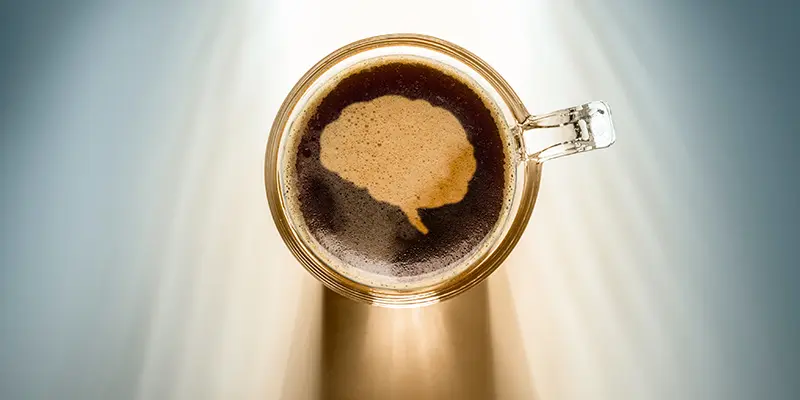
Ahh, that first sip of coffee in the morning. It’s what gets you out of bed. The ritual of waking up, smelling the scent of your favorite brew, and taking that first gulp gets your energy going for the day like nothing else. But does it really help you function optimally, or does it actually shrink your brain and cause a higher likelihood of dementia and stroke?
According to a new study conducted in 2022 and published in Nutritional Neuroscience, brain health suffers as a result of regular coffee intake. The large-scale study consisted of over 17,000 participants and thoroughly investigated the effects of drinking coffee on total brain volume. Data from the study suggests a higher likelihood of decreased brain volume, dementia, and stroke in people who drink more than 6 cups of coffee per day.
Does caffeinated coffee really help you function optimally, or does it actually shrink your brain and cause a higher likelihood of dementia and stroke?10 CONSEQUENCES OF COFFEE AND CAFFEINE
Nearly 75% of Americans drink coffee every day, and coffee is the highest consumed psychoactive drug in the world. While not everyone drinks a massive amount of coffee a day, even three or more cups can be problematic for optimal brain function.
Here are 10 of the most common physical side effects produced by regular caffeine consumption. All of these have an impact on brain health and should be considered when consuming coffee and other caffeinated drinks or supplements.
1. Disrupted sleep.
Sleep patterns are disrupted by caffeine as it blocks the chemical adenosine, which signals our bodies to sleep. Limiting caffeine intake to the early morning doesn’t necessarily mean you won’t have trouble sleeping that night. How your body metabolizes caffeine, how much caffeine you’ve had in total and the timing of when you’ve consumed it all play a role in its effect on sleep.
2. Addictive cycle.
Having a cup of coffee now and then will likely not elicit an intense addiction to caffeine, but if you consume a large amount of coffee on a regular basis and try to stop, you will likely experience withdrawal symptoms such as irritability, fatigue, and headaches.
3. The jitters.
Some people love that shaky, hyper-energized feeling that caffeine produces, but research shows that caffeine does not actually increase mental alertness. The preoccupation and distraction caused by jitteriness can offset any potential benefits in attentiveness and performance.
4. Elevated blood pressure and heart rate.
A higher heart rate means that your heart must work harder to pump blood to the rest of your body, and your organs and tissues can suffer as a result. Consuming caffeine can spike your blood pressure as well, which decreases the amount of oxygen and blood to your heart.
5. Lower blood flow to the brain.
Research published in Human Brain Mapping suggests that a 250-milligram dose of caffeine (about 2-3 cups of coffee) constricts cerebral blood flow, which can result in premature aging. Despite weighing only 3 pounds, your brain uses 20% of your body’s oxygen and blood flow; constricting that flow has a negative impact on your entire being as it carries nutrients and oxygen to your cells and flushes out toxins.
6. Brain dehydration.
About 80% of brain mass is water. When our brains are depleted of water or dehydrated it can cause issues with the ability to focus, depression, anxiety and memory loss. Coffee may not necessarily be a direct cause of dehydration, but it is vital that you consume enough water every day to counter the effects of high caffeine intake.
7. Lower brain connectivity.
A 2021 study published in Molecular Psychiatry found that regular, high consumption of coffee and other caffeinated products negatively impacts brain functional connectivity relating to attention, alertness, motor control, learning, and memory. The areas of the brain examined in this study—somatosensory and limbic systems—are directly related to a “fight-or-flight” response and our emotional states. These connections are vital to our well-being.
8. Gastrointestinal issues.
A “sour” stomach is common among coffee drinkers due to an increase in acid secretion. Coffee may increase the risk of gastrointestinal discomfort including nausea, heartburn, gas, ulcers, and acid reflux (GERD). Suppression of appetite can also occur as it takes longer for our stomachs to empty and we have a feeling of being full from coffee. However, we need healthy food to thrive, not a pot of coffee. There is a powerful connection between our gastrointestinal system and the brain called the gut-brain axis. Our brain and gut communicate with each other about important functions such as emotions and cognition as well as how our intestines function.
9. Increase in inflammation.
A study found that just 200 milligrams of caffeine raise homocysteine levels, an inflammation, and cardiovascular disease marker that can potentially increase your risk of blood clots and damage to your arteries, which can result in heart disease and stroke.
10. Post-caffeine crash.
As much as a stimulant can increase your energy, once it leaves your system you might experience a significant decrease in energy, clarity, and overall cognitive function. Cycling through these high and low levels of energy throughout the day can wreak havoc on your brain.
Caffeine is found in other forms, including sodas and energy drinks, cacao beans, tea leaves, yerba mate, certain nuts, powders, and supplements, but is most often ingested through coffee. While there are studies that show the benefits of coffee, it is speculated that the other ingredients in coffee, not caffeine, are what can lower the risk of certain types of cancers and the risk of diabetes.
Drinking decaffeinated coffee can provide the upside of coffee consumption without the downside of caffeine side effects. A 2021 study noted the benefits of decaffeinated coffee consumption on blood sugar and other metabolic functioning and found that decaf coffee had a more positive impact on metabolic syndrome.
Dementia, addiction, and other mental health issues can’t wait. At Amen Clinics, we’re here for you. We offer in-clinic brain scanning and appointments, as well as mental telehealth, clinical evaluations, and therapy for adults, teens, children, and couples. Find out more by speaking to a specialist today at 888-288-9834 or visit our contact page here.





What are the implications for those of us that drink less than 6 cups/day? Seems like this would be an important portion of the population.
Comment by jeri — March 3, 2023 @ 3:31 AM
My mother has been drinking coffee every morning … still ‘has her mind’ at age 96; No more than 2 cups a day though!!!
Moderation.
Comment by Rockfellow Eades — March 3, 2023 @ 3:32 AM
I find this report to be so flawed! I am 63 and have been drinking coffee since 1st grade and the joke about me is my memory is incredible. It is like most things in life some people can handle it others can not. Case in point not everyone who drinks alcohol is an alcoholic or becomes one.
Comment by Gina Simunek — March 3, 2023 @ 5:02 AM
Great information although I think it fails to address the mold mycotoxins in most coffee which definitely lead to brain issues including dementia.
Comment by Pam — March 3, 2023 @ 5:13 AM
Thank you so very much for this article! I’ve just sent it to my adult children. I am constantly trying to remove inflammation especially in the brain as both of my parents have suffered from dementia. Thank you so much again, your articles are so very welcomed.
Comment by Debra Sgandurra — March 3, 2023 @ 5:41 AM
What would be a healthier alternative?
Comment by Lori — March 3, 2023 @ 6:15 AM
Thank you Dr. Amen & Staff so much for this valuable info, concerning caffeine! Now I will only drink decaffeinated 100% Arabica coffee! I learned from a coffee expert, that 100% Arabica, has the good nutrients, that Roasted coffee does not! When you can, please visit: The Master's Voice on Rumble & Bit-Chute?! Thank you sincerely!
Comment by Mr. Guido — March 3, 2023 @ 6:46 AM
Around the years 2005-2010 I was involved with youth substance abuse prevention through a federal grant. We viewed a video by Dr. Amen….and read his books also. The video (CD) showed what a brain looks like on caffeine….I'll never forget that image.
Comment by Jan — March 3, 2023 @ 7:06 AM
Do these same consequences apply to water processed decaf coffee?
Comment by J Grawey — March 3, 2023 @ 9:41 AM
I think if you drink more than 6 cups of anything other than water per day you will have problems! This is just common sense! Year ago, our family Doctor (remember when they existed?) always said everything in moderation. He was so far ahead of his time!
Comment by Joseph — March 3, 2023 @ 11:32 AM
I don’t drink coffee, but I do drink a lot of brewed regular black tea mostly at lunches or dinner daily in restaurants
Comment by Leslie Stewart — March 3, 2023 @ 12:32 PM
What about decaffeinated? Is that harmful
Comment by Antonella O'Hara — March 3, 2023 @ 1:19 PM
All I can tell you is when my husband is finished with his morning coffee, he literally starts falling asleep at the breakfast table a short while later. So when you hear hear that coffe exhausts the adrenal glands, believe me, from what I see, that is very true. Who in their right mind wants that?! I myself drink a variety of herbal teas, and love every minute of it.😋☕️Also no problems from it.😊
Comment by Maureen — March 4, 2023 @ 1:00 PM
Does the caffeine in organic black tea have the same effect on your brain. I drink iced tea all day long.
Comment by Pat Farrell — April 17, 2023 @ 2:32 PM
What about YERBA MATE?? Please advise?!?
Comment by Melissa — April 30, 2023 @ 9:05 AM
The Gerson Institute protocol uses organic, mold free (therapy-grade) coffee enemas for detoxification. A quart at a time usually. The premise is that it detoxifies the liver plus stimulates the body to product glutathione, a master antioxidant which can help chelate certain metals out of the body. I'm 67 and starting to have severe memory loss but I also have had sleep apnea for years but was never a coffee drinker. I also have pulmonary hypertension.
Coffee enemas have helped rid of intestinal worms and deal with pain from Complex Regional Pain Syndrome and also lowers my blood pressure. So I'm confused by these studies. Would it affect the brain differently if taken as an enema versus orally?
Comment by Cathy — May 7, 2023 @ 6:23 AM
I’m very disappointed with this information about coffee and brain health! In the past the information on coffee suggested it reduced the risk of Alzheimer’s and now it’s the opposite .
Comment by Meredith Blaney — June 9, 2023 @ 11:17 AM
Everything in moderation. No one size fit all, so this report can apply to all humanity. I enjoy very much my coffee
Comment by Rocio Herroz — June 9, 2023 @ 3:30 PM
This should be titled “What does caffeine really do for your brain”…there are all kinds of caffeinated beverages not just coffee and their decaffeinated options with most beverages.
Comment by Deborah Fletcher — June 21, 2023 @ 12:16 PM
It would be nice to see SPECT Scans before and after the high coffee consumption.
Comment by Tim — January 20, 2024 @ 8:32 PM